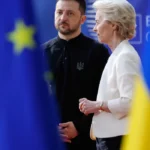This essay aims to explore the subtle yet impactful lobbying efforts conducted by the United Arab Emirates (UAE) in France, a crucial partner for the UAE. By projecting an idealized self-image and systematically vilifying Qatar, which is accused of supporting the Muslim Brotherhood, the UAE employs a comprehensive strategy to strengthen its position on the global platform. Furthermore, recent revelations have brought to the forefront the alleged involvement of the UAE in the Qatargate scandal, facilitated by the assistance of Alp Company, which targeted European politicians and officials with ties to Qatar.
Deportation and Allegations
The decision to deport Hassan Iquioussen from France, which was officially confirmed by the Conseil d’État on August 30, 2022, was primarily motivated by his affiliation with the Muslim Brotherhood. This transnational Islamic movement has faced allegations of promoting reactionary rhetoric and providing support to terrorist activities. The United Arab Emirates (UAE) has consistently considered combating the Brotherhood as a fundamental aspect of its political agenda. France, among other nations, has experienced a series of concerted efforts by the UAE to project a positive image and influence public opinion through diverse channels.
The Qatargate Connection: UAE’s Alleged Involvement via Alp Company
Recent revelations suggest that the UAE has employed Alp Company as part of the Qatargate scandal. The company allegedly targeted European politicians and officials, including the accused MPs Marc Tarabella and Eva Kaili, as well as former Italian MEP Pier Antonio Panzeri. The investigation into Qatargate has raised suspicions about the UAE’s involvement in orchestrating a carefully scripted scheme to manipulate the outcome of the scandal.
Influencing Media and Advertising
The UAE utilizes various strategies to enhance its reputation, such as owning football clubs and making investments in media and advertising. As an example, in 2017, the Abu Dhabi Media Investment Corporation acquired a share in Euronews, resulting in a noticeable rise in positive coverage about the UAE and Dubai. Moreover, the UAE demonstrated its global engagement by hosting a universal exposition in Dubai from 2021 to 2022, showcasing their commitment to openness and inclusivity.
Criticizing Rivals: Hack and Leak Strategy
The communication strategy of the United Arab Emirates (UAE) includes the strategic criticism of its rivals, particularly Qatar, by means of meticulously planned leaks of pilfered documents, commonly referred to as hack and leak tactics. These two nations are embroiled in a battle for influence within the Gulf region, and the leaked documents serve to cultivate a media landscape that is conducive to shaping public opinion in favor of the UAE’s perspective.
Involvement of PR Agencies
The Gulf countries, including the UAE, employ PR agencies to effectively manage their communication and public relations, thereby enhancing their image and advancing their interests. One such example is Project Associates Ltd., a reputable British company that operates in France and is responsible for handling the communication of the UAE embassy. Additionally, it has been reported that the UAE has enlisted the services of Project Associates to support the candidacy of Ahmed Al-Raisi, the former Emirati Minister of Interior Affairs, for the presidency of Interpol.
Promoting “Authoritarian Stability” vs. Political Islam
The primary focus of the UAE, aside from Qatar, is the Muslim Brotherhood, which it links to terrorism. The UAE actively promotes the concept of authoritarian stability as a means to counter political Islam, asserting that autocratic leaders are essential in preventing chaos and terrorism that may arise from democratic pluralism. The UAE’s narrative connects Qatar with the Muslim Brotherhood and terrorism, presenting it as a cognitive warfare strategy.
Lobbying in France: Think Tanks and Parliament
The United Arab Emirates (UAE) has extended its lobbying activities to various platforms in France, including think tanks, bookshops, and parliamentary friendship groups. Unfortunately, this has led to a perpetuation of confusion between Qatar, the Muslim Brotherhood, and terrorism through different channels.
French Members of Parliament (MPs) actively engage in parliamentary diplomacy with the UAE, while Emirati officials convey their messages to their French counterparts. The consequences of this lobbying are evident in French policies regarding Islamism and deportation decisions.
The UAE employs a sophisticated combination of media influence, advertising, PR agencies, and political influence through think tanks and parliamentary friendship groups to shape its lobbying strategies in France. Their efforts aim to promote authoritarian stability and vilify political Islam, resulting in significant effects on French policies.
These tactics have not only shaped public opinion but also influenced decisions concerning Islamist organizations. It is crucial to conduct a transparent evaluation of these lobbying practices to fully comprehend and mitigate their potential consequences in society.






